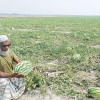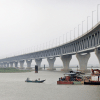WB to help build Padma indirectly
The World Bank will indirectly help Bangladesh in constructing the Padma bridge though it has withdrawn its fund over an allegation of corruption conspiracy, as the project is very important for the economy. "We will continue to help the government to get that project done if that is where it indicates its priorities to be," said Johannes Zutt, WB country director for Bangladesh and Nepal, at a media briefing on the assessment of the 2013-14 budget at his office in the capital. "It does not necessarily mean direct financing. Indirectly, the WB financing can make a contribution because it is contributing to the overall financing of the development priorities of the government," he said. Last year, the Washington-based lender cancelled a $1.2 billion funding for the largest ever infrastructure project in the country after it had learned about a high-profile corruption conspiracy. "If resources are no longer needed in a part, they are free to go to another part.... But taking that money in financing other parts to an equal amount means that it frees up money that then can be shifted on the government side to the Padma," Zutt elaborated. Of the long-term consequences of the WB probe into the project, Zutt said, "It is important to recognise that Bangladesh is not the only country in the world that is struggling with governance challenges. Every country in the world has governance challenges of this nature." Both public and private sectors should work together to address these challenges, he said, adding that if a government official was at the receiving end in an exchange of a bribe, a private sector individual made the offer. Bangladesh still has the opportunity to show how serious it is about making progress in addressing the corruption issues for medium and long terms, the WB country director said. "We certainly would like to see the opportunity seized." The country will face political challenges over the next six to eight months, as it goes through an electoral period. Bangladesh, however, must show democratic maturity in coping with political disruptions that can discourage economic decision-makers from taking decisions needed to keep the economy moving forward. Speaking about the garment sector, Zutt said the owners of buildings and factories should do everything they possibly could to ensure workers' safety. If Bangladesh fails to do so, it will be difficult not only to attract further investments in the sector, but also to attract foreign investments in other sectors, he noted.

 For all latest news, follow The Daily Star's Google News channel.
For all latest news, follow The Daily Star's Google News channel. 








Comments